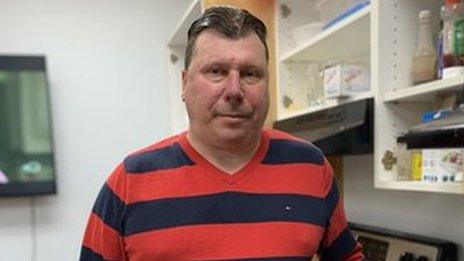The scheme that gives alcohol to alcoholics
- Published
Peter tells how regular doses of drink are proving a lifeline to him
In the first project of its kind in Scotland, a project in Glasgow aims to stabilise alcoholics by giving them alcohol.
It is 10:00 and Peter is getting his first "pour" of the day - an agreed measure of lager deemed sufficient to curb his cravings to binge.
Peter is 60 and has been a chronic alcoholic since he was a teenager.
He is one of 10 men at the Managed Alcohol Programme (MAP) in Glasgow, which is based on a model used in Canada I visited three years ago.
It is for the most chaotic homeless alcoholics who have already tried and failed traditional abstinence programmes.
Every hour or two hours the residents are given a measure of wine or beer to keep sufficient alcohol in their bloodstream to prevent a seizure but not enough to get them drunk.
In addition they get a home, stability and some structure, the chance to engage with mental health services and develop their interests.
The proposal was controversial with some but it has now been up and running for 12 months.
For the past few months we have had exclusive access to the pilot.
'I think I was an alcoholic when I was 16'
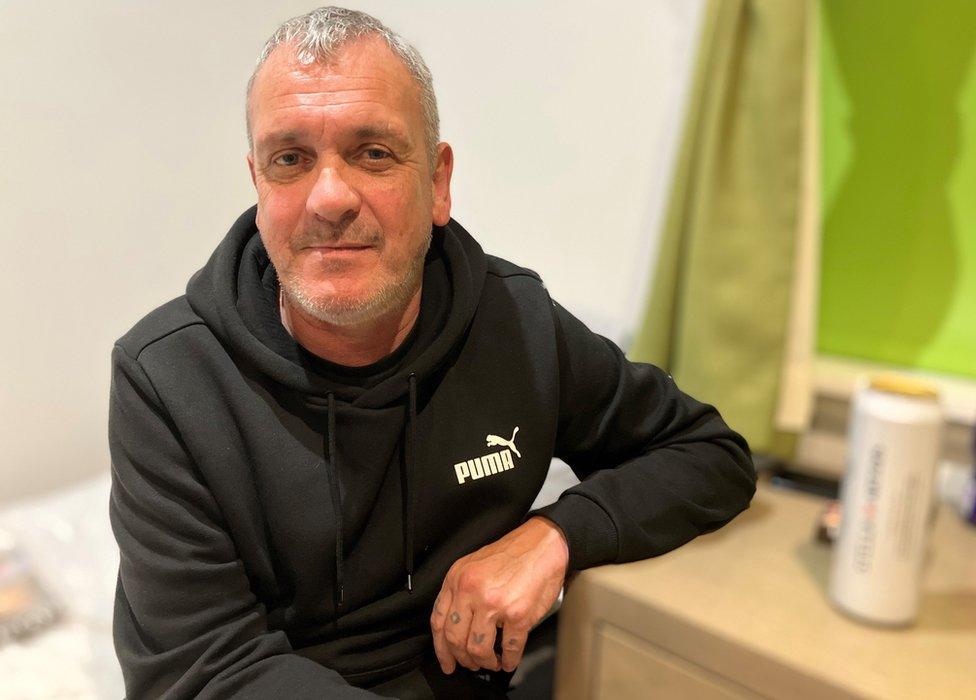
Peter says the MAP has helped him a lot
The first time we go in with the camera in October 2022 one resident seems a little inebriated, lurching from wall to wall.
There's been an argument between one man who has been buying extra alcohol and another who is trying his best to reduce his intake.
Peter admits he has had a lot to drink. His best friend has just died from an alcohol-related illness. He doesn't want to die the same way but for today, he is drowning his pain.
He says: "I think I was an alcoholic when I was 16, because I used to drink two bottles of wine, two bottles of Buckfast every night with my mum." She bought it for him, he says.
When we return two weeks later, Peter is doing better.
He has been to the dentist for the first time in decades, started eating meals, and getting in touch with his family after years of silence and shame.
Every Monday he has a music lesson. His voice - deep and hoarse - tells a story in itself.
I ask him where he would be if he wasn't here.
"I'd be dead," he says. "Because I just kept doing it - buying drink. This has helped me a lot, this place."
Now, eight months after he entered the house, Peter is talking about getting a flat of his own and a dog.
'My body isn't going to take much more'
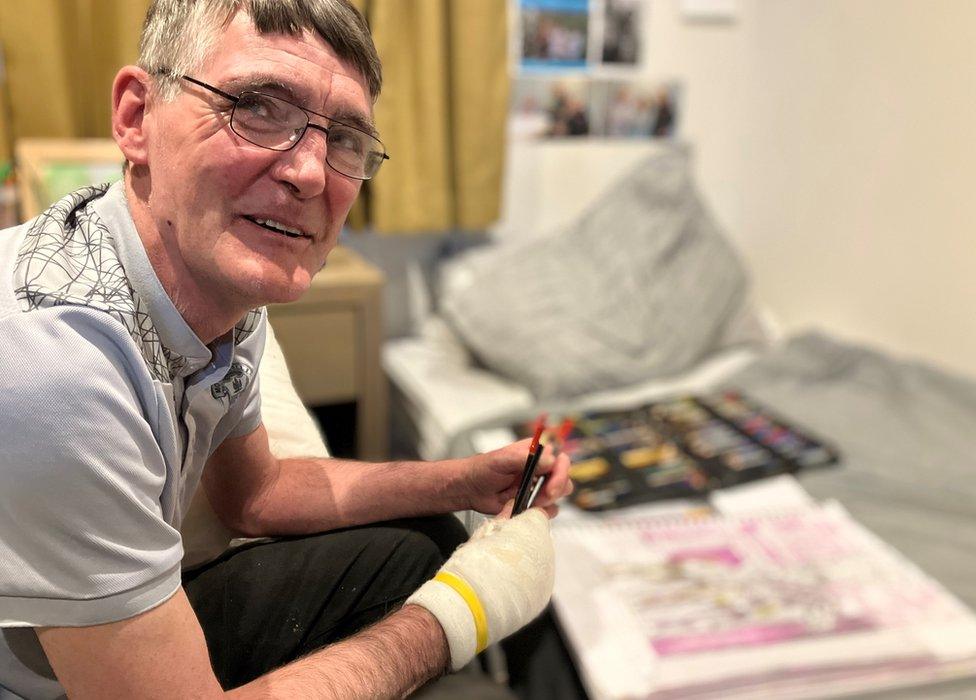
Paul was asked to leave the project
Paul is making lunch for himself and the other residents. Pork chops, mashed potatoes and vegetables. Eating hot meals together is one of the benefits of the programme.
The 51-year-old says he has an appetite for the first time in decades.
He spent much of his childhood in hospital because of a serious skin condition.
Paul says he already had a problem with alcohol by the time he was a teenager. When he was referred to the MAP he says he was consuming around 30 units - equivalent to almost a bottle of vodka - a day.
"I was seeing the police every day because I was doing my drinking on the street," he says. "I was getting lifted by the police every Friday or Saturday.
"I need to start slowing down. My body isn't going to take much more. This place has opened my eyes to that."
After lunch he receives his 'pour' - a can of lager in his room. He sips it while sketching Glasgow's iconic statue of the Duke of Wellington with a traffic cone on his head.
"I am a wee bit happier, believe it or not, but the thing is when you come out of drunkenness after 20 or 30 years then your regrets come back as well," he says. "You realise what a mess you have made of your life. And then the guilt comes in."
Paul says he feels much more positive about his future.
But just the next day staff say his drinking and behaviour spirals out of control and he is asked to leave the project.
Bumps along the way
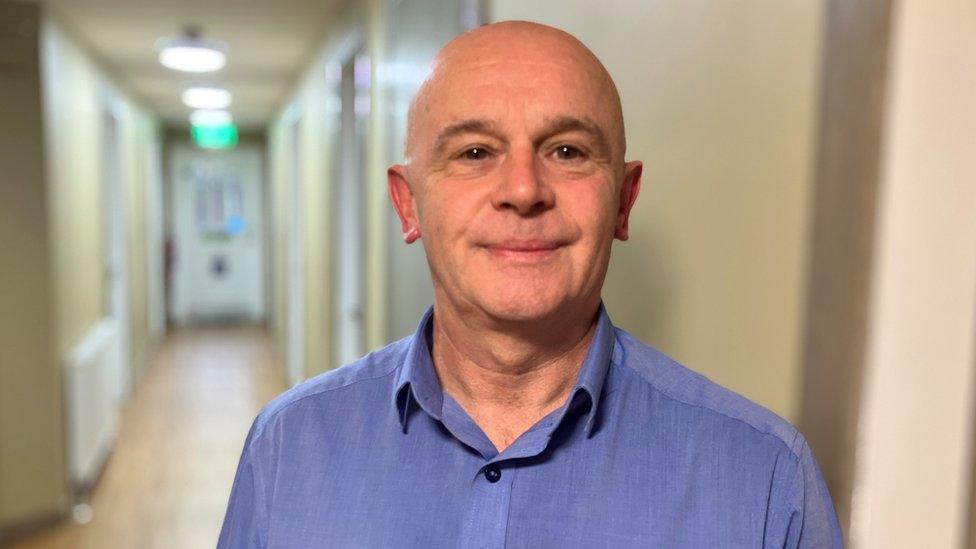
Project manager Peter McLachlan says the first year has been a learning curve
For some the MAP will not work. Paul and another man have already been told to leave the project and a third has left through mutual agreement.
Manager Peter McLachlan says the first year has been a "learning curve" with "bumps" along the way.
"For some guys this might not be the right place, it might not be the right treatment, they might not be ready for it at this particular time," he says.
But those still in the service have significantly cut their drinking, Mr McLachlan says. They have started to look after themselves, started going to the dentist, optician, and GP, and significantly reduced their run-ins with police and paramedics.
Not every applicant is accepted. Blood tests, liver scans and psychological assessments are done to see if the men are physically strong enough.
The economic argument
The project is funded by the homeless charity the Simon Community with support from the Scottish government.
Not everyone supported the idea or methodology.
The men choose and buy their own alcohol and pay for it with their benefits.
Traditionally alcohol rehabilitation has focused on detox but views have changed since the MAP opened and there is already interest from other areas in Scotland, England and other European countries.
Karyn McCluskey, the head of Community Justice Scotland, was behind piloting the Canadian model here.
She analysed the cost to emergency services of these men street-drinking before they entered the project and believes the cost of not having the MAP would run into "millions" of pounds.
"One of the men that I looked at had been taken to Glasgow Royal Infirmary by ambulance over 400 times in a period of two and a bit years," she tells the BBC.
"That is extortionate. I mean serious amounts of money. Probably millions."
She says some people may have a "visceral reaction" to the MAP but that telling these men to stop has not worked.
She says: "The tears of their children and families would have made them stop but they can't so we have to try to give them less."
- Published17 August 2021
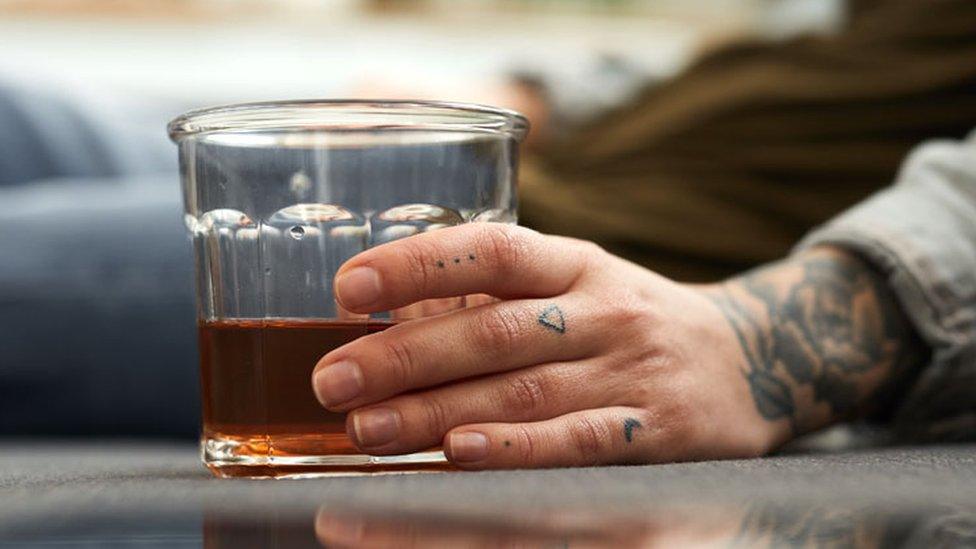
- Published4 February 2020
